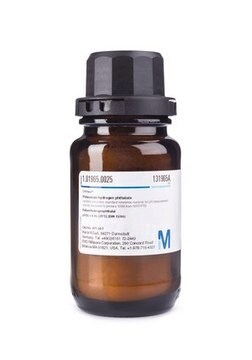Kluczowe dokumenty
60357
Potassium phthalate monobasic
reference material for titrimetry, certified by BAM, >99.5%
Synonim(y):
KHP, Phthalic acid monopotassium salt, Potassium biphthalate, Potassium hydrogen phthalate
About This Item
Polecane produkty
klasa czystości
reference material
Poziom jakości
Próba
>99.5%
jakość
certified by BAM
metody
titration: suitable
pH
4
mp
295-300 °C (dec.) (lit.)
Zastosowanie
environmental
Format
neat
ciąg SMILES
[K+].OC(=O)c1ccccc1C([O-])=O
InChI
1S/C8H6O4.K/c9-7(10)5-3-1-2-4-6(5)8(11)12;/h1-4H,(H,9,10)(H,11,12);/q;+1/p-1
Klucz InChI
IWZKICVEHNUQTL-UHFFFAOYSA-M
Szukasz podobnych produktów? Odwiedź Przewodnik dotyczący porównywania produktów
Powiązane kategorie
Opis ogólny
Zastosowanie
Cechy i korzyści
- Available as a solid in a secure glass bottle to ensure its stability for the entire shelf life until opened.
- High-purity material traceable to NIST SRM
- High-quality offering accurate titer determinations
- Accompanied by a certificate of analysis (CoA)
Komentarz do analizy
Kod klasy składowania
11 - Combustible Solids
Klasa zagrożenia wodnego (WGK)
WGK 1
Temperatura zapłonu (°F)
387.1 °F - Pensky-Martens closed cup
Temperatura zapłonu (°C)
197.3 °C - Pensky-Martens closed cup
Środki ochrony indywidualnej
Eyeshields, Gloves, type N95 (US)
Wybierz jedną z najnowszych wersji:
Certyfikaty analizy (CoA)
Nie widzisz odpowiedniej wersji?
Jeśli potrzebujesz konkretnej wersji, możesz wyszukać konkretny certyfikat według numeru partii lub serii.
Masz już ten produkt?
Dokumenty związane z niedawno zakupionymi produktami zostały zamieszczone w Bibliotece dokumentów.
Klienci oglądali również te produkty
Nasz zespół naukowców ma doświadczenie we wszystkich obszarach badań, w tym w naukach przyrodniczych, materiałoznawstwie, syntezie chemicznej, chromatografii, analityce i wielu innych dziedzinach.
Skontaktuj się z zespołem ds. pomocy technicznej






